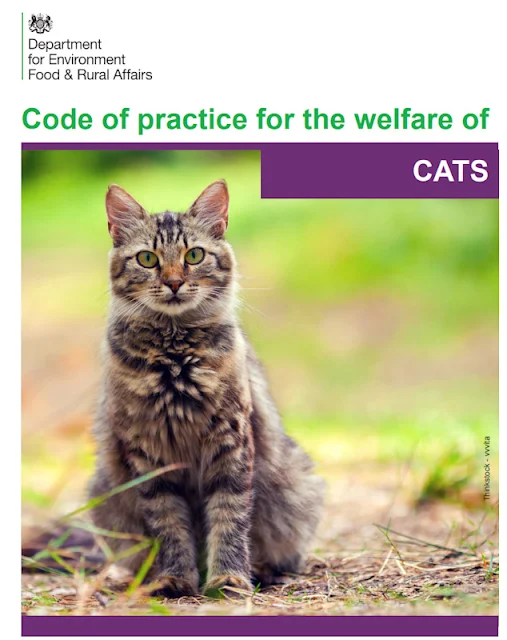 |
| How to provide a suitable environment for your cat to live in (9 pointers) as per DEFRA. Image: DEFRA. |
As per the advice (reproduced verbatim here) of the UK government in following the Animal Welfare Act 2006 which is based on basic principles of cat caregiving, here is how to provide a suitable environment for your cat to live in. The Animal Welfare Act 2006 is an excellent piece of legislation as it also provides guidelines on cat caregiving. It more or less says that doing the opposite to good cat caregiving can amount cat abuse/cruelty and be a crime. This list was prepared by the UK governments Canine and feline sector group.
- Provide your cat with a safe, comfortable, dry, draught-free, clean and quiet place where it can rest undisturbed. Ideally, there should be a range of such places available – the cat will choose where it is most comfortable.
- Take all reasonable steps to protect your cat from hazards indoors and outdoors.
- Make sure your cat has constant access to a variety of safe hiding places including elevated resting places, where it can feel safe.
- If your cat does not go outside, make sure it has plenty of activities to do and enough space to exercise, climb and play indoors.
- Your cat should be provided with a suitable toilet area, that is quiet, easily accessible and kept clean.
- Before you move your cat, you should gradually get it used to a secure cat carrier. Putting items which smell like the cat, for instance its blanket, in the carrier and any place you move your cat to can help it feel at ease.
- Any place where your cat is left must be large enough and comfortable with effective ventilation and temperature control so that your cat is able to move around to ensure its comfort, avoiding becoming too hot or too cold. Never leave your cat in an area where this is not possible such as a car on a warm day.
- Your cat should not be routinely kept in a cage.
- If you have any concerns about moving to a new home, or transporting your cat, you should consult a vet or other suitably qualified cat care specialist.
As you can see these are fundamental pointers. Safety comes first. For me there is a pressing need for cat caregivers to do much more if they keep their cats inside all the time. Point number 4 refers to this aspect of care caregiving.
It is called 'environmental enrichment'. A term that I am sure you have heard before. It is not enough to shut the doors and windows on your cat and sit back and believe that you have done all you can to keep you cat safe.
There are many hazards in the home and if the home is stressful because it is not enriched health problems can follow. A barren home may be no safer for an indoor cat than an indoor/outdoor life depending on the location and hazards/predators outside.



No comments:
Post a Comment
Your comments are always welcome.
Note: only a member of this blog may post a comment.